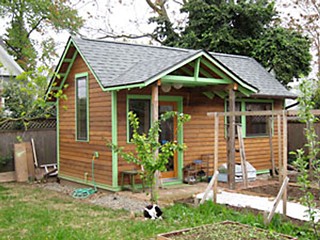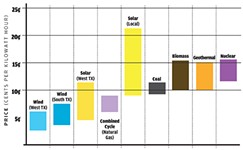Then There's This: Split Views on ADUs
'Granny flats' measure breaks from the CodeNext Pack
By Amy Smith, Fri., June 20, 2014
This election year is creating some interesting, fun-to-watch group dynamics on the City Council dais, where two members are running for mayor and two are competing for the District 9 seat. The remaining three of the seven have reached their term limits and are out of here come Jan. 1.
That's not to say they're not contributing to the jockeying business on the dais. Witness last Thursday night/Friday morning, when the Council finally took up the divisive issue of Accessory Dwelling Units, also known as ADUs, granny flats, in-law apartments, secondary dwellings ... and so forth.
The ADU resolution, sponsored by Council member and District 9 candidate Chris Riley and co-sponsored by Council member and mayoral candidate Mike Martinez, seeks to relax existing "regulatory barriers" for homeowners to build, on their property, small apartment units – no more than 500 square feet.
The measure narrowly passed 4-3 along political and gender lines: Riley, Martinez, Mayor Lee Leffingwell, and Bill Spelman in favor, with Riley's District 9 rival Kathie Tovo, mayoral candidate Sheryl Cole, and Laura Morrison (a Tovo supporter) opposed. The opponents' preference is to have this emotionally charged issue be a part of the CodeNext process, an ongoing effort to revise the Land Development Code. The city's website touts the CodeNext process as a "collaboration between Austin's residents, business community, and civic institutions to align our land use standards and regulations with what is important to the community."
Riley and Tovo are both land-use enthusiasts, though they often come at it from different angles – Riley, who lives Downtown and is an avid bicyclist, from a dense, new urbanism perspective, and Tovo, the mother of two young children, from a neighborhood "character" viewpoint.
So it's not surprising that the two competitors are sharply divided on – not ADUs, per se – but the process by which these new rules are to be crafted.
Under the current code, ADUs up to 850 square feet are allowed on lots that are 7,000 square feet or larger. In some neighborhoods, they're allowed on 5,750 square feet. Many homeowners wishing to build have either been hamstrung by the requirements, or, in some cases, the costs associated with building and owning an ADU.
Without question, Austin needs more housing options in central city neighborhoods, and small backyard dwellings – "invisible density," as Riley put it last week – are certainly preferable to ill-fitting stealth dorms and super-duplexes. Easing requirements on small ADUs – such as eliminating parking and driveway requirements – could help address a student housing shortage, provide more affordable options for young singles and aging seniors, and give homeowners a revenue stream to help pay their property taxes and other living expenses, Riley said.
Riley's proposal, which borrows a page from a Portland, Ore., code change, quickly gained support from aspiring ADU homeowners – like Julie Montgomery, who testified she gave up trying to build one because of city obstacles – as well as renters, and members of AURA (formerly Austinites for Urban Rail Action), a grassroots group that has broadened its activism beyond rail to include land use and affordability issues.
Riley's good intentions notwithstanding, the ADU proposal brought out the neighborhood troops to testify against it last week. The Austin Neighborhoods Council estimated there had been about two hours' worth of opposition testimony, but by the time the Council took up the agenda item shortly before midnight, the list of pros and cons signed up to speak was considerably smaller.
The ANC's chief quibble with the proposal is the reduction of parking requirements for the new line of ADUs. And on the whole, the ANC and other opponents expressed dismay that Riley's plan sidesteps the CodeNext process, which is having enough trouble getting ANC buy-in as it is. "Furthermore," ANC president Mary Ingle told Council, "this proposed resolution disrespects the community's good debate, participation, and city processes, such as neighborhood planning processes, by circumventing CodeNext and violating the directives of Imagine Austin for respecting the existing neighborhood plans."
When it came time to vote, Riley argued that his ADU proposal addresses a housing shortage in a way that would be "minimally disruptive" to neighborhoods. He said these "micro units" are playing a more important housing role in major cities across the country. Regarding parking concerns, Riley said the city has a number of tools to deal with parking woes. "We can restrict parking on one side of the street or the other; we have residential permit parking; we have parking benefit districts. ... But frankly," he added, "when it comes down to it, the real issue is that right now I'm more concerned about housing people than I am about storing cars."
Tovo agreed that street parking is less of a problem in some neighborhoods than others, but in close-in urban neighborhoods, the problems are adversely impacting residents' quality of life. With that, she proposed a motion that would give priority to a stakeholder process before setting the wheels of a code change in motion. Riley's proposal calls for both proceeding at the same time, and he rejected Tovo's motion as not "friendly." It went down on a 3-4 vote, as did a motion by Cole to have the ADU proposal join the CodeNext process.
Got something to say on the subject? Send a letter to the editor.











